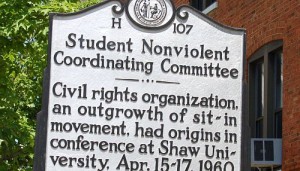Last Thursday in Washington, my wife Christy and I were pleased to be part of the annual awards ceremony held by Search For Common Ground (SFCG), a sterling NGO that works on tough reconciliation projects worldwide. The organization is led by two of our dearest friends, John and Susan Collin Marks.
One of this year’s honorees, rapper Emmanuel Jal of South Sudan, electrified the crowd with a surprise performance of dance and song. The evening brimmed with inspirational stories and music, ending with freedom songs led by Ysaye Barnwell of Sweet Honey in the Rock. For me, it was quite a contrast from the comic whirlwind of appearing on the Colbert Report the previous night.

Here is a photograph of Diane and me with her award. We were both pretty happy.
A blog on the SFCG website describes the ceremony and the six honorees for 2011.
My part in the program was to present the final Common Ground award to Rep. John Lewis, Rep. Bob Filner, and Diane Nash for their pioneer roles in the 1961 Freedom Rides fifty years ago. I have known and admired John Lewis since 1968, and worked for him at the Voter Education Project out of Atlanta in the summer of 1969. Like John, Diane Nash was a founder of the Student Nonviolent Coordinating Committee (SNCC) in 1960. She deserves greater recognition as an influential force in the civil rights movement. For decades now, I have told her that whatever actress plays her in a film version of my trilogy, for which there is renewed hope now at HBO, will deservedly become a star.
Below is the text of my presentation at the ceremony.
Presentation Remarks by Taylor Branch
Honoring the 1961 Freedom Riders
Search for Common Ground Awards Ceremony
The Carnegie Institute for Science
Washington, DC
October 27, 2011
The word “movement†in social history holds many meanings. Movements begin with a stir of inspiration, sometimes when only one person feels moved. They adapt or not by leaps of analysis and faith. They can grow by contagious response of hidden but limitless potential.
On Mother’s Day Sunday of 1961, not for the first or last time in civil rights history, Diane Nash acted forcefully to expand the identity and purpose of young colleagues in the freedom movement. “What do we do now?†she asked suddenly at a picnic. They were celebrating the success of a harrowing forty-night desegregation campaign at Nashville’s movie theaters. Everyone said the news bulletins were terrible about the bus burned in Anniston and the Freedom Riders beaten in Birmingham, but her insistent question baffled them. Why us, they responded, when the tragedy was way off yonder in Alabama, and why now, when their own battered movement needed recuperation?
“Way off yonder is where we decide it is,†Nash declared. If publicized beatings could stop the Freedom Riders, she added, the nonviolent movement would shrivel everywhere and die. She made them miserable with her vision of responsibility until the Nashville students resolved to move not by plans or petitions but by swift and disciplined witness to the very spot in Birmingham where white mobs had bludgeoned the first wave of Freedom Riders. They renewed the stalemate over whether an integrated bus could move, literally, a foot beyond the Birmingham bus station. They persevered to create a movement that gripped the White House and eventually the whole world with a broader conception of freedom.
Some may object that these Freedom Riders were too fiercely militant for this award, but the nonviolent student movement was an ideal catalyst for common ground. They remained steadfastly prepared to die but not to kill or injure for their cause. They absorbed more beatings and went deliberately to jail, making eye contact with oppressors. They unified means and ends across barriers of conflict. Their movement pulled together distant heartstrings to build common ground on common citizenship and humanity, setting in motion not only new laws but daily justice and freedom still enjoyed by millions of people with every breath.
It is altogether fitting, and a privilege, that Search For Common Ground honor these three people on behalf of the 1961 Freedom Riders. Rep. John Lewis of Atlanta has been steadfast from the first inspiration, when few paid any attention to the original riders, through his sterling career in public service. Rep. Bob Filner of San Diego left Cornell to join more than four hundred contagious responders on Freedom Rides into prison in Mississippi, from which they emerged transformed and transforming. Last but not least, Diane Nash spurred a leap of commitment in the highest tradition of democratic self-government. She gave the Freedom Rides her fire of enlightened determination. We invite all Freedom Riders present to join her now on the stage.



